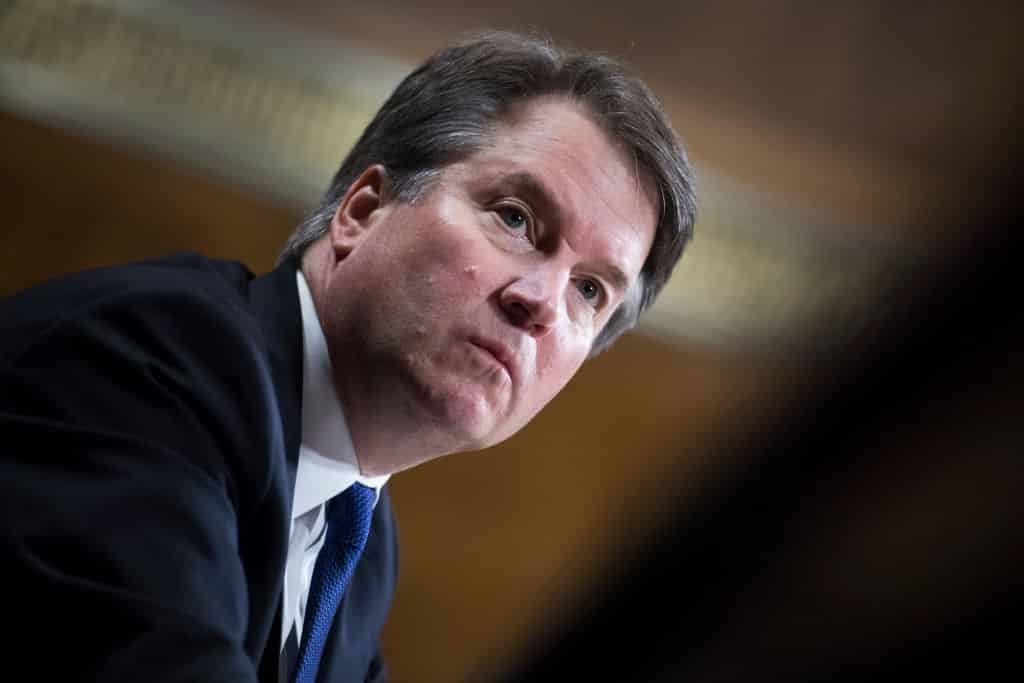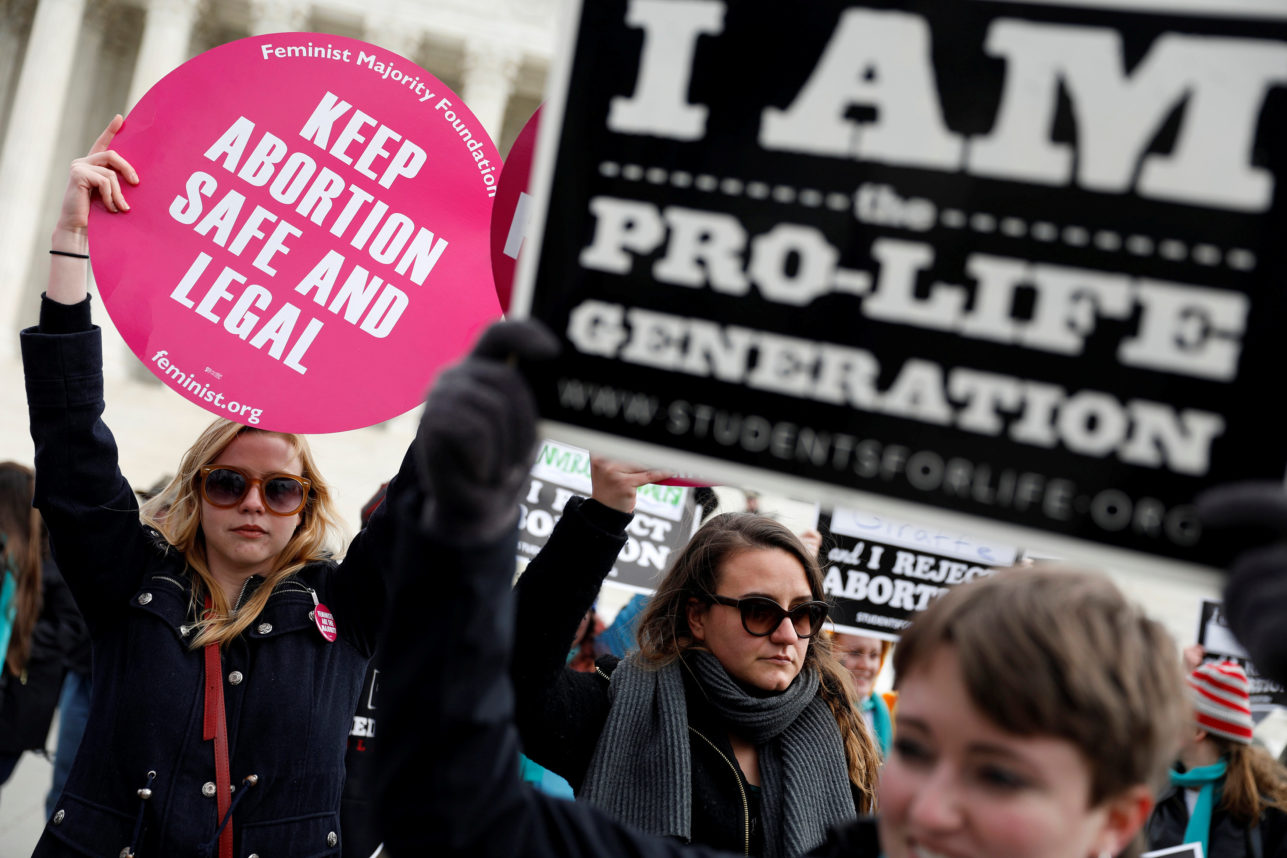 Judge Brett Kavanaugh testifies during the Senate Judiciary Committee hearing on his nomination be an associate justice of the Supreme Court of the United States, focusing on allegations of sexual assault by Kavanaugh against Christine Blasey Ford in the early 1980s. (Photo By Tom Williams-Pool/Getty Images)
Judge Brett Kavanaugh testifies during the Senate Judiciary Committee hearing on his nomination be an associate justice of the Supreme Court of the United States, focusing on allegations of sexual assault by Kavanaugh against Christine Blasey Ford in the early 1980s. (Photo By Tom Williams-Pool/Getty Images) In September of 2018, I was arrested in an act of civil disobedience during the first day of Brett Kavanaugh’s confirmation hearing. I stood in a room full of senators and staffers and shouted that confirming Kavanaugh to the highest court would mean not only an end reproductive freedom for Americans but an end to religious freedom as well.
I was right.
In 2016, the Supreme Court ruled 5-3 that the state of Texas could not impose arbitrary and unfair restrictions on abortion clinics, also called TRAP Laws (targeted restrictions on abortion providers), that create undue burdens on the patients seeking care in those facilities. This case, Whole Woman’s Health v Hellerstedt, upholds the standards that were set way back in 1992 with the Supreme Court Case Planned Parenthood v Casey that decided no restriction placed upon abortion access could create an undue burden for someone seeking care. In 2016, the Supreme Court affirmed the right of any person to seek timely and holistic abortion care in an abortion clinic.
My constitutional rights as a woman and a Jew are being stripped away, piece by piece.
So why is the Supreme Court currently deliberating on a near-identical case? Now, as they deliberate on June Medical Services v Russo, I once again fear that my constitutional rights as a woman and a Jew are being stripped away, piece by piece.
In both cases, Texas and Louisiana attempted to impose TRAP laws onto clinics. Specifically, one that would require abortion clinics to have admitting privileges to nearby hospitals. On the surface, this may seem like a good thing: in the case of an emergency, of course, a medical clinic should have access to emergency services.
There are a few problems with this idea. Firstly, this law goes far, far beyond what is medically necessary. The likelihood of a medical emergency occurring in an abortion clinic is extremely low, and most outpatient surgical centers in this country aren’t required to have admitting privileges. Additionally, the decision of whether or not to allow admitting privileges to an abortion clinic lies with the hospital. In some states, up to 40% of all hospitals are Catholic, meaning they are extremely unlikely to work with an abortion clinic. Regardless of the practicalities of how backward requiring admitting privileges is, they were deemed unconstitutional in 2016.
For there to be an identical Supreme Court case being decided on at this very moment is absurd. It’s not only a violation of my constitutional right to have an abortion, but it’s also a violation of my religious liberty.
Largely to the disbelief of fundamentalist Evangelical Christians and Catholics, they do not have a monopoly on religion in this country.
Largely to the disbelief of fundamentalist Evangelical Christians and Catholics, they do not have a monopoly on religion in this country. While their voices may be the loudest protesters of such things as racial justice, LGBTQ rights, and, of course, a woman’s right to choose, they aren’t the only voices. It is extremely important to know that there are people of faith inside abortion clinics. They are the doctors, nurses, support staff, and of course, they are the patients.

Jewish women, specifically, are not unfamiliar with this fight. We have been on the frontlines of the abortion justice movement since its inception. From Heather Booth founding the Jane Network to Ilyse Hogue, President and CEO of NARAL Pro-Choice America, Jewish women have committed themselves to the struggle for reproductive freedom.
What the Right refuses to understand is that abortion is not only permissible, in some cases it is required in order to save the life of the pregnant person. But this nuance about abortion, among many, many nuances in Jewish teachings on this subject, falls on deaf ears. But I know, as an American, my first amendment right to religious liberty is also the freedom from religion.
As an American, my first amendment right to religious liberty is also the freedom from religion.
It’s why I have spent so much time protesting, testifying, and writing about my right to reproductive freedom. Kavanaugh has proved my worst fears, just as I knew he would. Susan Collins (R-ME) insisted that the would-be Justice understood that previous rulings made by the Supreme Court were law-of-the-land. She went on record to say that precedent, “is a constitutional tenet that has to be followed except in the most extraordinary circumstances.” Yet Kavanaugh seems to have found that the opportunity to legislate women’s bodies to be the perfect extraordinary circumstance. Thus, on February 7th, 2019 Brett Kavanaugh voted to refuse a stay of a TRAP law in Louisiana, going directly against the precedent set by the Supreme Court in 2016 in Whole Woman’s Health v Texas.
Kavanaugh has proven himself to be an enemy of Jewish women.
Steph is an activist and writer in D.C. and is proud to work for the National Council of Jewish Women.




















 More news and opinions than at a Shabbat dinner, right in your inbox.
More news and opinions than at a Shabbat dinner, right in your inbox.